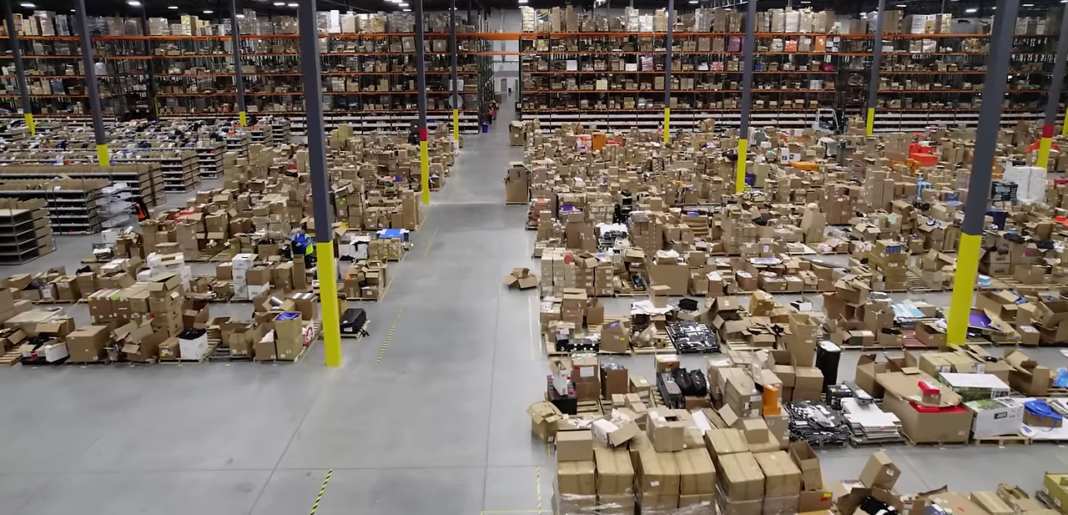The Rise of Front-Loading as Tariff Uncertainty Grows
In anticipation of impending tariffs on Chinese and Mexican imports, major U.S. retailers and manufacturers have ramped up front-loading—a strategy of stockpiling goods in advance to mitigate potential cost increases. A prime example is a 1,000,000-square-foot warehouse in Fort Worth, Texas, housing millions of dollars’ worth of goods ahead of the expected tariffs.
Big brands such as Walmart and Columbia Sportswear have significantly increased imports from China, with Walmart’s imports rising 33% between 2023 and 2024 and Columbia Sportswear’s imports jumping 50% in the same period. From March to December alone, Columbia’s imports surged over 80%, reflecting an urgent rush to acquire goods before new tariffs are imposed.
The result? A dramatic increase in container imports from China to the U.S. throughout 2024. This move, initially a response to shipping disruptions in the Red Sea, has now become a proactive measure against anticipated tariff hikes.
The Domino Effect of Tariffs on Supply Chains
If enacted, the proposed tariffs will not only increase costs for corporations but will also directly impact consumers. The new policies under discussion include a 25% tariff on imports from Mexico and Canada, along with a 10% tariff on Chinese goods. These tariffs function as a government-imposed tax on imported services and products, inevitably leading to price hikes across multiple industries.
Everyday products including automobiles, fuel, and clothing; will see higher prices. Even essential goods such as tomatoes and household appliances are expected to become more expensive. The impact extends beyond retail, affecting infrastructure projects reliant on imported components. A Fort Worth warehouse, for example, is currently stocked with 500,000 square feet of products used in domestic infrastructure development, such as electrical equipment and road construction materials.
Logistics Companies Under Pressure
For logistics firms, the front-loading trend has led to increased demand for warehousing and transportation services. Companies like ITS Logistics benefit not only from moving goods but also from storing them. However, these additional costs eventually trickle down to consumers.
The warehouse surge reflects a broader economic concern: while large corporations with extensive supply chain infrastructure can absorb the impact of tariffs, smaller importers are far more vulnerable. Without access to expansive storage facilities or the ability to front-load, smaller businesses will be forced to pass higher costs onto their customers.
The Footwear Industry Faces a Crisis
One of the most affected industries is footwear. Companies like Deer Stags, which produces over two million shoes annually, rely on China for 98% of their imports. Unlike giants such as Walmart, smaller firms in the footwear sector lack the ability to preemptively stockpile goods.
Footwear companies already pay hefty tariffs, with over 430 different duty classifications dating back to the 1930s. Additional tariffs would not only impact future imports but could also apply retroactively to existing orders, creating financial uncertainty. Importers and brokers face nightmares as they attempt to determine responsibility for these extra costs, further complicating an already volatile market.
Mexico’s Role in U.S. Trade and Potential Retaliation
Beyond China, Mexico is the largest importer of goods into the U.S., surpassing China with $466 billion in imports in 2024. The automotive industry is particularly at risk, as 76% of the 3.5 million vehicles produced in Mexico are destined for the U.S. market.
If tariffs are imposed on Mexican imports, the consequences will be severe. Mexico’s President has warned that such measures would result in the loss of 400,000 jobs and a potential 1.7% reduction in Mexico’s GDP over the next five years. The Mexican government has already stated that it will retaliate if tariffs are implemented, signaling a looming trade war that could have long-lasting economic repercussions.
Implications for Businesses and Consumers
The ongoing trade tensions highlight the fragility of global supply chains, and the risks associated with economic nationalism.
- For Businesses: Larger corporations with established logistics networks will likely manage these changes better, while smaller firms without the capacity to front-load may struggle to compete.
- For Consumers: Higher import costs will translate into increased retail prices, affecting everyday goods from clothing to electronics and automobiles.
- For the Economy: The imposition of tariffs could lead to retaliatory actions from China, Mexico, and other key trading partners, potentially slowing global trade and economic growth.
What Lies Ahead?
With economic uncertainty mounting, the best course of action for businesses is to diversify their supply chains. Companies overly reliant on Chinese or Mexican imports should explore alternative manufacturing hubs, such as Vietnam, India, and other Southeast Asian markets, to mitigate risks.
Government intervention may also play a crucial role. If tariffs are enacted, federal policies could be implemented to support industries most affected by cost increases, like subsidies for semiconductor manufacturing in Arizona.
Key Questions for the Future:
- Will the U.S. government reconsider its tariff policies amid growing inflation concerns?
- How will China and Mexico respond to these trade restrictions?
- Can smaller importers survive in an increasingly protectionist economy?
As trade tensions escalate, businesses, policymakers, and consumers must prepare for a shifting economic landscape where adaptability will determine success. The coming months will reveal whether these policies create more economic resilience or unintended consequences that could ripple across industries and economies worldwide.
Jack Reynolds is a market analyst with a focus on equity markets, alternative investments, and macroeconomic trends.




